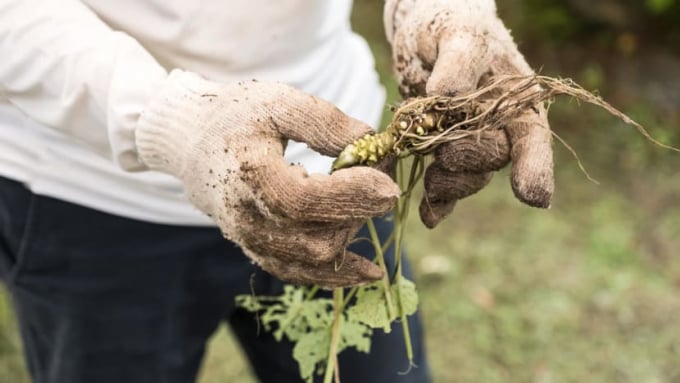November 27, 2025 | 23:49 GMT +7
November 27, 2025 | 23:49 GMT +7
Hotline: 0913.378.918
November 27, 2025 | 23:49 GMT +7
Hotline: 0913.378.918

A farmer holds a freshly harvested wasabi plant at a rural farm in Nara, Japan. Photo: iStock
"Recently the power of typhoons feels totally different from before due to global warming. It's getting stronger," said the 70-year-old farmer in Okutama, west of downtown Tokyo.
"Since it's happened once, there's no guarantee it won't happen again."
Wasabi, the tangy Japanese horseradish that's an essential part of sushi and dabbed onto slices of raw fish or into bowls of soba buckwheat noodle soup, is usually grown along streams in narrow valleys, leaving farms prone to disasters.
Typhoon Hagibis, which slammed into eastern Japan in 2019, slashed production in Okutama by nearly 70 per cent the next year. The need for replanting and careful tending meant it's taken nearly three years for sushi farms there to recover.
Experts say global warming is affecting production not only by increasing the number and severity of storms, but with rising temperatures that threaten growth of the plants, which need to be in water with a consistent temperature between 10 and 15 degrees Celsius year-round.
A lack of wasabi could also endanger traditional Japanese foods such as sushi and sashimi, where the tang of the wasabi is used as a contrast with raw fish.
Weather is not the only obstacle wasabi farmers face. A drop in rural populations due to aging means there are no successors. Because of the two factors, the output of wasabi grown in clear-flowing water, like at Hoshina's farm, had fallen to half that of 2005, according to the Agriculture Ministry.
Norihito Onishi, head sales manager at a chain of soba buckwheat noodle restaurants called Sojibo, has seen his business directly affected by wasabi shortages and supply problems.
The restaurants were long known for allowing customers to grind their own wasabi roots to produce the spicy paste used as a condiment for soba. But they've had to mostly give this up.
"In the past, we served all the cold soba noodles with a piece of raw wasabi, but now we can no longer do that," Onishi said.
Though wasabi root was plentiful when the restaurant first opened 30 years ago, Onishi said over the last five to 10 years there have been times when he couldn't get any at all. The precious root is now made available only for certain types of dishes.
"If this unstable supply of wasabi persists, due to many factors including global warming, we will face a situation where we need to come up with other ways to overcome the problem so we don’t end up not serving raw wasabi at all," said Onishi.
(CNA)

(VAN) A new study reveals how the simultaneous effects of ocean acidification, salinity and loss of oxygen are making the world more fragile.

(VAN) Hopes are growing that the creation of the first 3D turkey gut model could be a turning point in the battle against the virulent blackhead disease.

(VAN) Tyson, America’s biggest meat supplier, plans to shutter one of its largest beef processing plants as the industry continues to struggle with low cattle supplies and political pressure from Washington.

(VAN) New FAO study shows how digital solutions are empowering farmers and fishers to prevent losses and build resilient agrifood systems.

(VAN) Brazil's COP30 presidency pushed through a compromise climate deal on Saturday that would boost finance for poor nations coping with global warming but that omitted any mention of the fossil fuels driving it.

(VAN) Poultry farmers in the UK have been warned that they could face one of the worst winters yet for bird flu.

(VAN) Prices of main-crop paddy have risen sharply, with jasmine rice hitting 16,100 baht per tonne — the highest level in years.